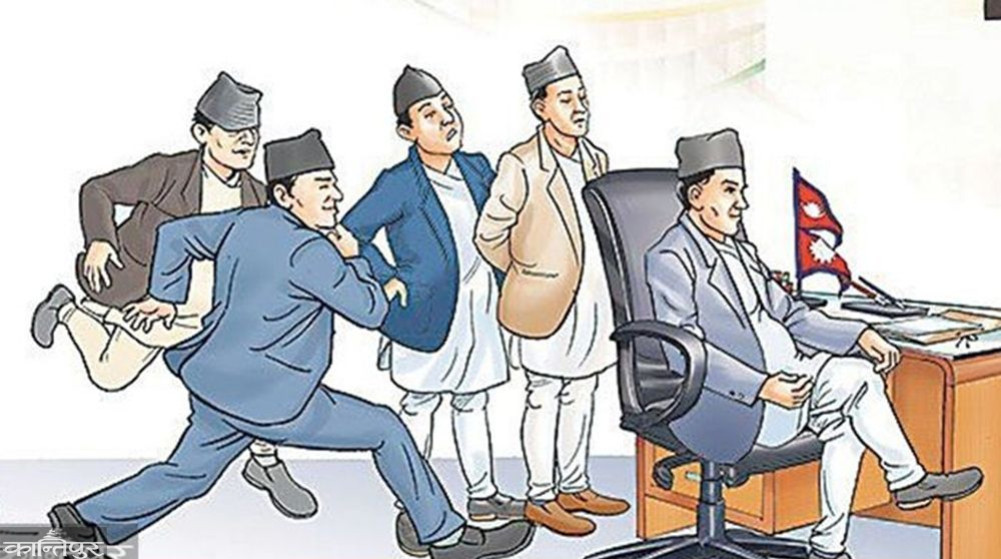A Mirror of Armed Conflict
We use Google Cloud Translation Services. Google requires we provide the following disclaimer relating to use of this service:
This service may contain translations powered by Google. Google disclaims all warranties related to the translations, expressed or implied, including any warranties of accuracy, reliability, and any implied warranties of merchantability, fitness for a particular purpose, and noninfringement.


A radio playing in a roadside shop was saying - the death of a woman who was mentally unstable after being hit by the vehicle of Minister for Women, Children and Social Welfare Janardhan Adhikari.



Even though the fictional story has ended, the waves in the mind start to bounce even more. The past starts ringing. Many faces of Peepala, Anuradha come to mind at once, Sahilau i.e. Janardhan Adhikari's ugly face also fills the mind.
author Bimal Nepal experienced the environment I have experienced before. I have been stuck in the same environment. I have closely experienced the beginning, height and end of the armed conflict. It seems that the novel has shown a mirror of the same life, the same plight. Some have also undergone surgery.
s are many plots. There are many true stories. With the art of connecting the same story with Bimal, it has taken the form of a book, in the form of 'Pipla'. This book shows the mood and reality of a person from a low class family who dreams a lot. The story doesn't just focus on Peepala. Sameer's part is no less poignant. It has helped to closely understand the needs and desires of a low-class family.
The decades-long Maoist armed conflict is an important event in Nepali history. It has both good and bad sides. It has advocated for rights and equality at the lowest level of the community. Even Earthlings have been able to understand their powers. On the other hand, the family and society that were broken by that conflict are still not separated from the pain.
The Maoist war brought many dreams to the Nepali society, which was plagued by hunger, disease and scarcity. Many enlisted in war either by desire, expectation or compulsion. Pipala was forced to carry a gun at an early age after completing his education. The Anuradhas were also led into war. A person with bad character like Sailou got a good position.
study and family joins the lone war not all can be managed. This novel has well told how much they had to live a poor life. Those who could cover the opportunity became MPs and ministers many times. They were also able to accumulate millions in wealth. The wounded of the war are still suffering with bullets in their bodies. They are forced to go for foreign employment. Some have taken menial jobs in the city to earn a living.
The novel 'Peepla' clearly shows the state of Nepali society during the conflict, the tragedy, the mood of students and the general public. The book has also tried to discuss the condition, desires, responsibilities and obligations of the lower and middle class families. The central character in the
novel is Pipla. Peepala represents many of the participants in the war. Pipla's painful day begins after the murder of Paro Sir. Incidents like kidnapping and murder were experienced by many students at that time. This will have a bad effect on the psychology of the students.
Separation with good friend Sameer, Sahilau's sexual abuse and a sense of revenge with Pipla who endured many tortures. It is not even possible to take revenge by going to war. He is the hero of the war, a person of tyrannical, adulterous, murderous character. The days of Peepala, who entered the city bewildered by the war, have become more sad.
Nabhulai also tries to survive by acting as a bahulai - Pipla. Even though his love for Sameer is small, he has gathered Jijivisha in his heart.
It can be said about Peepala's rescue - even those who are running away from the world and themselves out of love do not let the hope fade in their hearts.
Pipla has been raised as an example of people living despite being defeated everywhere. He did not get justice anywhere. In all the vicissitudes of life he has nothing but sorrow. This sorrow, misery, tragedy is not only the story of Pipla, but the story of many Nepalis. Sahinlous have their place in the society. Even yesterday, the same characters ruled the society, even now they are still present. It is because such characters are ruling the lives of the Pipalas that there is no peace and happiness. This trend is still going on in the current society.
During the Maoist armed conflict, the mood of the community, the hardships faced by the community, the killing of innocent and good people, the entry and elevation of bad people into the party, the family separation suffered by ordinary families, as well as the results of studying, family, and all sacrifices, one should read 'Peepla'.
Those who experienced the situation at that time should read this book to better understand those days, while the later generation should read it to understand the situation at that time.
Stylistically, the novel flows smoothly. The plot is curiously moving forward. It is unusual for Sameer not to recognize Bahulahi even when he meets him up close. Not a very long period of time, but not being able to find a classmate doesn't seem natural.
 प्रकाशित : फाल्गुन १९, २०८० ११:४४
प्रकाशित : फाल्गुन १९, २०८० ११:४४

 २१.१२°C काठमाडौं
२१.१२°C काठमाडौं
















